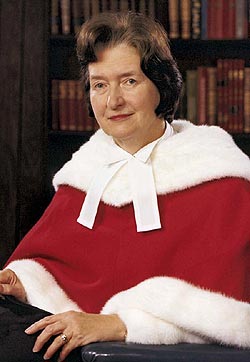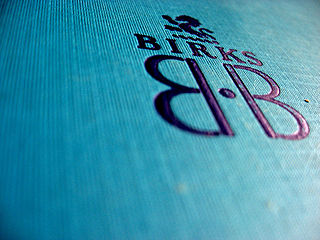Henry Birks & Sons (Montreal) Ltd v Montreal (City of), [1955] S.C.R. 799 was an early constitutional decision of the Supreme Court of Canada where the Court struck down a provincial law permitting municipalities to pass by-laws for the closing of stores on certain Catholic feast days. Henry Birks and Sons, a chain of jewelry stores, objected to the lost business on holidays. The Court held that the law was a matter of public morals and therefore fell within the exclusive criminal law powers of the federal government and so was ultra vires the competence of the province. This case marked the first of a gradual shift in Canadian law away from non-secular laws.

The Supreme Court of Canada is the highest court in the judicial system of Canada. It comprises nine justices, whose decisions are the ultimate application of Canadian law, and grants permission to between 40 and 75 litigants each year to appeal decisions rendered by provincial, territorial and federal appellate courts. The Supreme Court is bijural, hearing cases from two major legal traditions and bilingual, hearing cases in both official languages of Canada.
In law, certiorari is a court process to seek judicial review of a decision of a lower court or government agency. Certiorari comes from the name of an English prerogative writ, issued by a superior court to direct that the record of the lower court be sent to the superior court for review. The term is Latin for "to be made more certain", and comes from the opening line of such writs, which traditionally began with the Latin words "Certiorari volumus...".

Hill v Church of Scientology of Toronto February 20, 1995- July 20, 1995. 2 S.C.R. 1130 was a libel case against the Church of Scientology, in which the Supreme Court of Canada interpreted Ontario's libel law in relation to the Canadian Charter of Rights and Freedoms.

Henekh "Henry" Morgentaler, was a Polish-born Canadian physician and abortion rights advocate who fought numerous legal battles aimed at expanding abortion rights in Canada. As a Jewish youth during World War II, Morgentaler was imprisoned at the Łódź Ghetto and later at the Dachau concentration camp.
Landmark court decisions, in present-day common law legal systems, establish precedents that determine a significant new legal principle or concept, or otherwise substantially affect the interpretation of existing law. "Leading case" is commonly used in the United Kingdom and other Commonwealth jurisdictions instead of "landmark case", as used in the United States.

R v Big M Drug Mart Ltd(Her Majesty The Queen in Right of Canada v Big M Drug Mart Ltd) is a landmark decision by Supreme Court of Canada where the Court struck down the federal Lord's Day Act for violating section 2 of the Canadian Charter of Rights and Freedoms. This case had many firsts in constitutional law including being the first to interpret section 2.

Bertha Wernham Wilson was a Canadian jurist and the first female puisne justice of the Supreme Court of Canada. Before her ascension to Canada's highest court, she was the first female associate and partner at Osler, Hoskin & Harcourt and the first woman appointed to the Court of Appeal for Ontario. During her time at Osler, she created the first in-firm research department in the Canadian legal industry.

The Court of Appeal of Quebec is the highest judicial court in Quebec, Canada. It hears cases in Quebec City and Montreal.

Jean-Marie Philémon Joseph Beetz,, c.r. was a Canadian lawyer, academic and judge from Quebec. He served as a puisne justice of the Supreme Court of Canada from 1974 to 1988.

Freedom of religion in Canada is a constitutionally protected right, allowing believers the freedom to assemble and worship without limitation or interference.

The Supreme Court of Canada was founded in 1875 and has served as the final court of appeal in Canada since 1949. Its history may be divided into three general eras. From its inception in 1875 until 1949, the Court served as an intermediate appellate court subject to appeal to the Judicial Committee of the Privy Council in Britain. Following 1949, the Court gained importance and legitimacy as the court of last resort in Canada, establishing a greater role for the Canadian judiciary. In 1982, the introduction of the Canadian Charter of Rights and Freedoms significantly changed the role of the Court in Canadian society, by providing the Court with greater powers of oversight over Parliament and through formal recognition of civil rights including aboriginal rights and equality rights.

Henry Birks was a Canadian businessman and founder of Henry Birks and Sons, a chain of high-end Canadian jewellery stores.

Peoples Department Stores Inc v Wise, 2004 SCC 68 is a major Supreme Court of Canada decision on the scope of the fiduciary duty upon directors and officers of a corporation. When examining the duty of directors under section 122(1) of the Canada Business Corporations Act ("CBCA"), the Court held that there is a distinction between the interests of the corporation and those of the stakeholders and creditors.

Syndicat Northcrest v Amselem [2004] 2 S.C.R. 551 was a decision of the Supreme Court of Canada that attempted to define freedom of religion under the Quebec Charter of Human Rights and Freedoms and section 2 of the Canadian Charter of Rights and Freedoms. Although the Supreme Court split on their definition, the majority advocated tolerating a practice where the individual sincerely feels it is connected to religion, regardless of whether the practice is required by a religious authority.
The table below lists the reasons delivered from the bench by the Supreme Court of Canada during 1999. The table illustrates what reasons were filed by each justice in each case, and which justices joined each reason. This list, however, does not include decisions on motions.
R v Marshall [1999] 3 S.C.R. 456 and R v Marshall [1999] 3 S.C.R. 533 are two decisions given by the Supreme Court of Canada on a single case regarding a treaty right to fish.

Birks Group Inc. is a designer, manufacturer, and retailer of jewellery, timepieces, silverware and gifts, with stores and manufacturing facilities located in Canada and the United States. The Group was created in November 2005 through the merger of Henry Birks and Sons Ltd. (Canada) and Mayors Jewelers Inc..
Pornography in Canada has changed since the 1960s when the Criminal Law Amendment Act, 1968-69 that suppressed various laws related to sexual norms was passed. There has been a shift in the mode of determining whether a material is obscene or not with the R v. Butler judgment. The obscenity laws were challenged as violative of freedom of expression in R. v Butler. Obscenity is defined as follows under the Criminal Code: "the undue exploitation of sex or of sex and one or more of the following subjects; namely, crime, horror, cruelty and violence." The court held that the term “undue” should be interpreted on the degree of harm which flows from such exposure that predisposes people to act in an anti-social manner. The court ruled that pornography is harmful if it contains violence or explicit sex which is degrading or dehumanizing and which creates a substantial risk of harm, as it harms a person's right to be equal. Therefore, there is a shift from the community standard's test to the harm test post the Butler judgment.
Suzanne Côté is a puisne justice of the Supreme Court of Canada. She was nominated by Prime Minister Stephen Harper to replace retiring justice Louis LeBel. Before her appointment to the Supreme Court, she was a partner at Osler, Hoskin & Harcourt LLP and previously Stikeman Elliott LLP in Montréal. She is the first woman appointed to the Supreme Court directly from private practice.